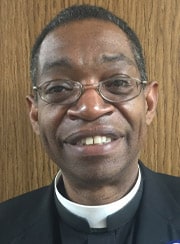Life at Saint Thomas West Hospital has settled into a new rhythm as the weeks under the COVID-19 pandemic have rolled on, according to Father John Raphael, a staff chaplain at the hospital.

“In the beginning, there was a lot of stress, a lot of anxiety,” said Father Raphael. Over the weeks, there were frequent and necessary adaptations of policy “because things were in flux,” he said.
“After several weeks, we settled into a new pattern of how things looked. … ‘OK, this is how we’re going to respond,’” Father Raphael said.
“There’s a new equilibrium in the hospital,” he said. “There’s a better sense now that we’re prepared. But always it’s important to be overly cautious.”
That means wearing personal protective equipment and maintaining social distance.
“At the hospital we are on a universal surgical mask policy,” Father Raphael said. “We are wearing a mask all day everywhere we go.”
Those precautions are even more extensive when he visits a patient who has the COVID-19 virus or is awaiting the results of a test.
Before visiting those patients, he must put on gloves, a gown, a second pair of gloves, an N-95 facemask, and a plastic face shield. The process requires assistance both when he is putting on the equipment and when he is taking it off.
“There are people designated to make sure that at no point in that process you or another person could be exposed,” he said.
The limits on visitors can be hard for the patients and their families, Father Raphael said.
“It’s difficult for patients and for us,” he said. “People are understanding by and large why this has to be done.”
He and the other chaplains have turned to virtual visiting to allow patients and their families to see and speak to each other online.
The situation is also stressful for the hospital staff, Father Raphael said. “Staff members are dealing with this, especially bedside folks, on a daily basis,” he said. “That level of stress just doesn’t dissipate.”
The hospital’s pastoral care staff “are here for our staff as we are here for our patients and their families,” Father Raphael said.
The pandemic has brought new challenges to parish priests as well. “The problem is there is no template,” said Father Zachaeus Kirangu, pastor of St. Patrick Church in McEwen and St. Elizabeth Ann Seton Mission in Tennessee Ridge.
Most home visits have stopped, except to see someone who is sick or dying.
“It’s difficult on any day to minister in circumstances like that,” said Father Dexter Brewer, pastor of Christ the King Church in Nashville and a Vicar General of the diocese.. “To have the barriers that are put up because of this pandemic makes it even more difficult still.”
In those situations, “normally you try to bridge the gap of isolation,” Father Brewer said. “With this pandemic, it’s all about isolation.”
“You do the best you can do,” he added. “Presence is a big thing.”
Father Bala Showraiah, OFM, pastor of St. Philip Church in Franklin, also tries to be present to people in need. When visiting parishioners in the hospital, he will sometimes walk through the parking lot looking for people sitting in their cars because they are unable to visit a loved one in the hospital.
“I ask if I can pray for them,” Father Bala said. “They are really happy, because they can’t see their family member who is sick or in surgery or dying. It’s a great blessing.”
St. Philip and Holy Name Church in East Nashville have both called all of the families in their parishes to check on them during the pandemic.
“Keeping in touch with them is very important,” Father Bala said. “It’s about relationships. We think about it as a family.”
“We have been trying to keep the parish strong,” physically, spiritually and mentally, he said. “We’re trying to help them by saying we are here with you, you are not alone.”
“They appreciated that so much,” Father Theo Ebulueme, pastor of Holy Name, said of the calls to his parishioners. “The phone calls made a lot of difference.”
In one case, the parish discovered a parishioner who had been affected by the March 3 tornado that they didn’t know about before and have been able to provide them with some assistance, Father Ebulueme said.
The social distancing measures have sometimes complicated the pastoral care the priests have provided.
On one visit to the home of a parishioner who had died, Father Kirangu found that no one in the house was wearing a mask.
“I just wanted to be gracious, so I was not wearing a mask,” Father Kirangu said.
“I want people to be respectful, to be peaceful,” in those situations, he said. “I don’t know if wearing a mask means I’m not being respectful, I’m only thinking about myself. It’s a thin line.”
“Especially when a parishioner of yours dies and you’re trying to keep a social distance, it is very hard,” Father Ebulueme said. “When you can not touch somebody or hug somebody … those means of telling an individual that I am with you … it’s very hard.”
“When they hug you, there’s nothing you can do. You have to hug them back,” he said.
Despite the pandemic and the restrictions that have followed, parishes have been reaching out to people.
“We’re doing everything we could to let them know we’re still here for them,” Father Brewer said.









